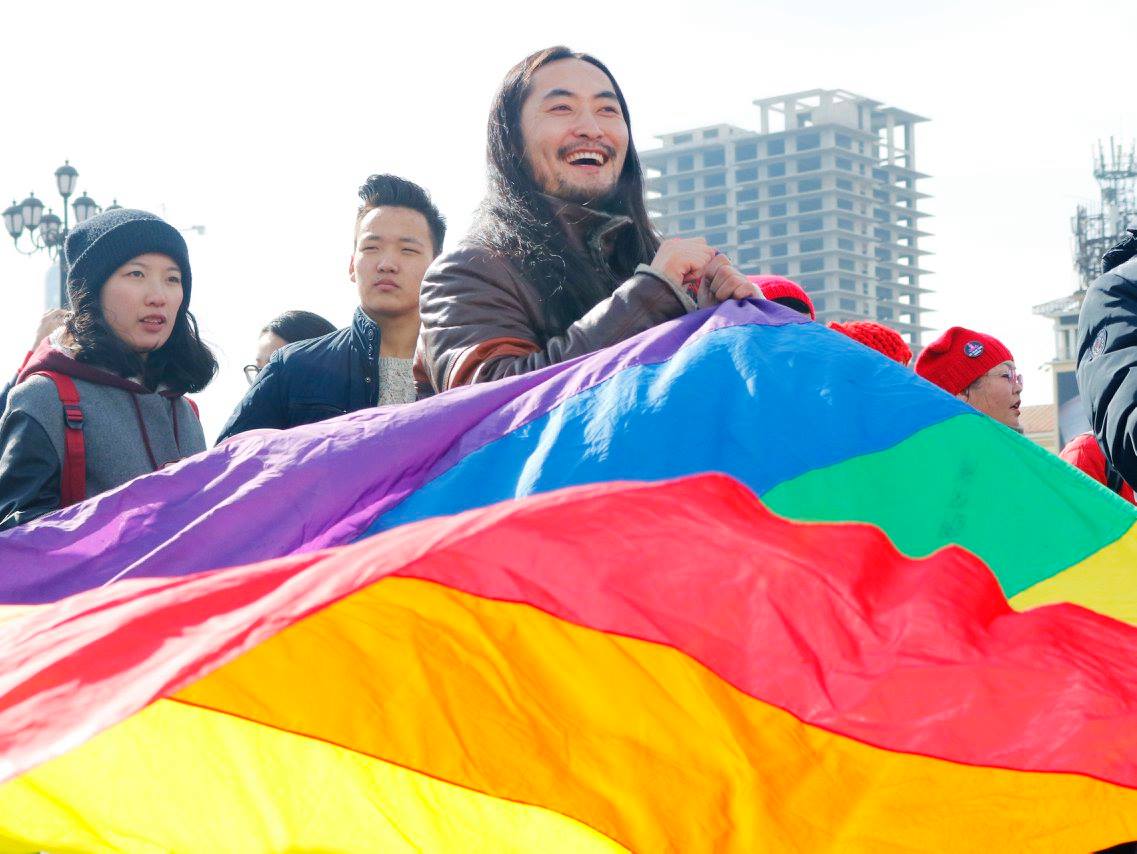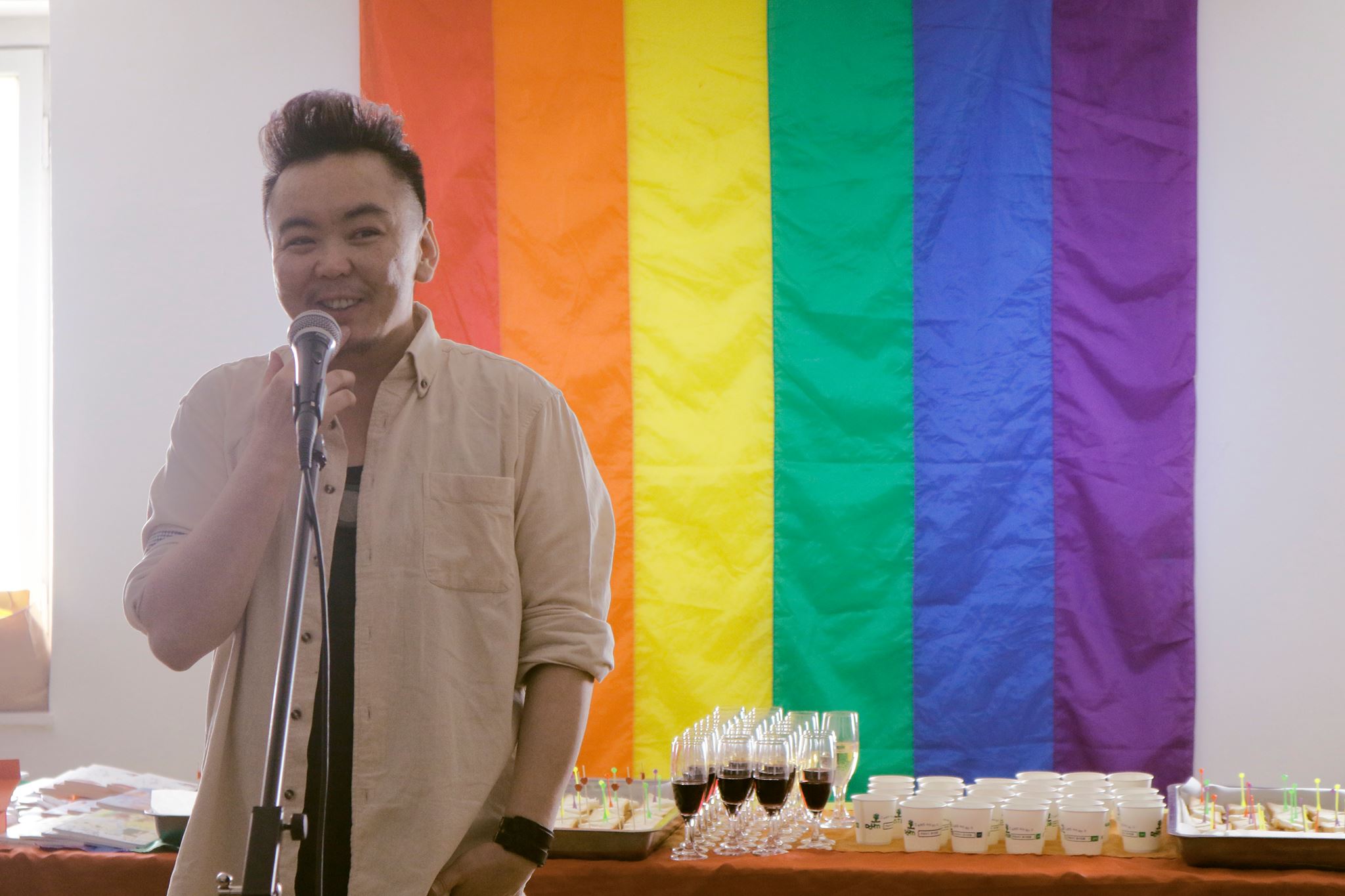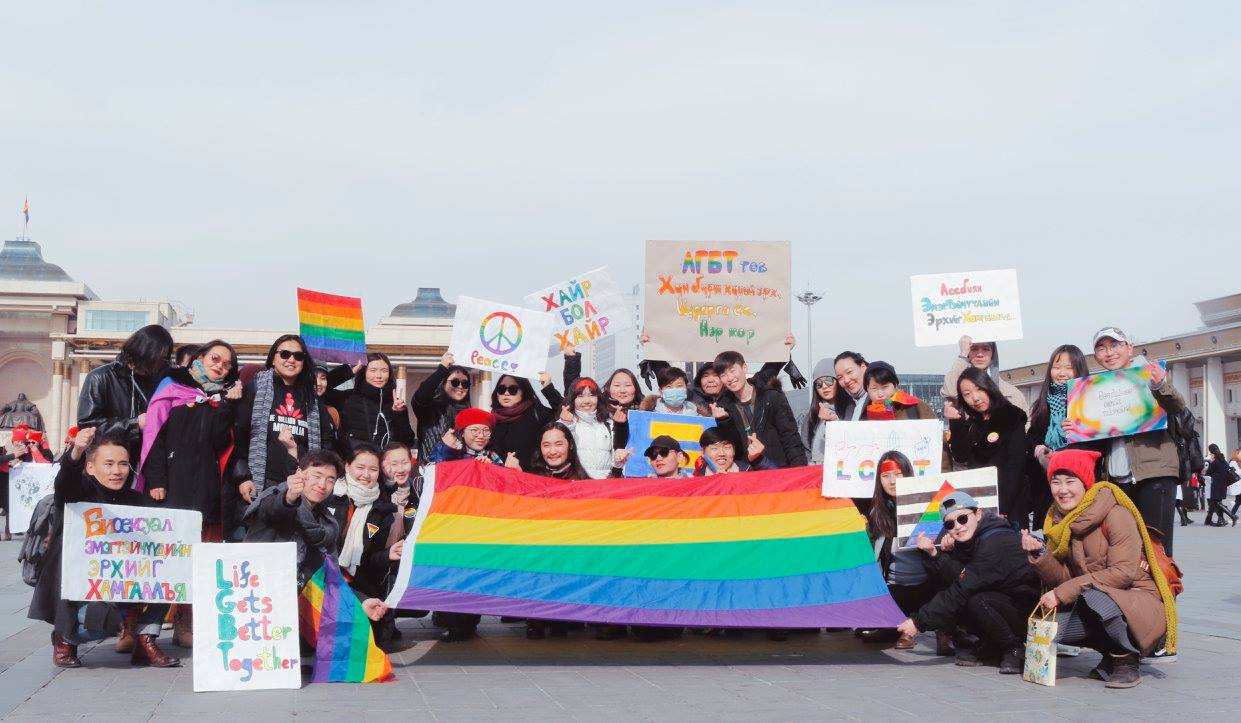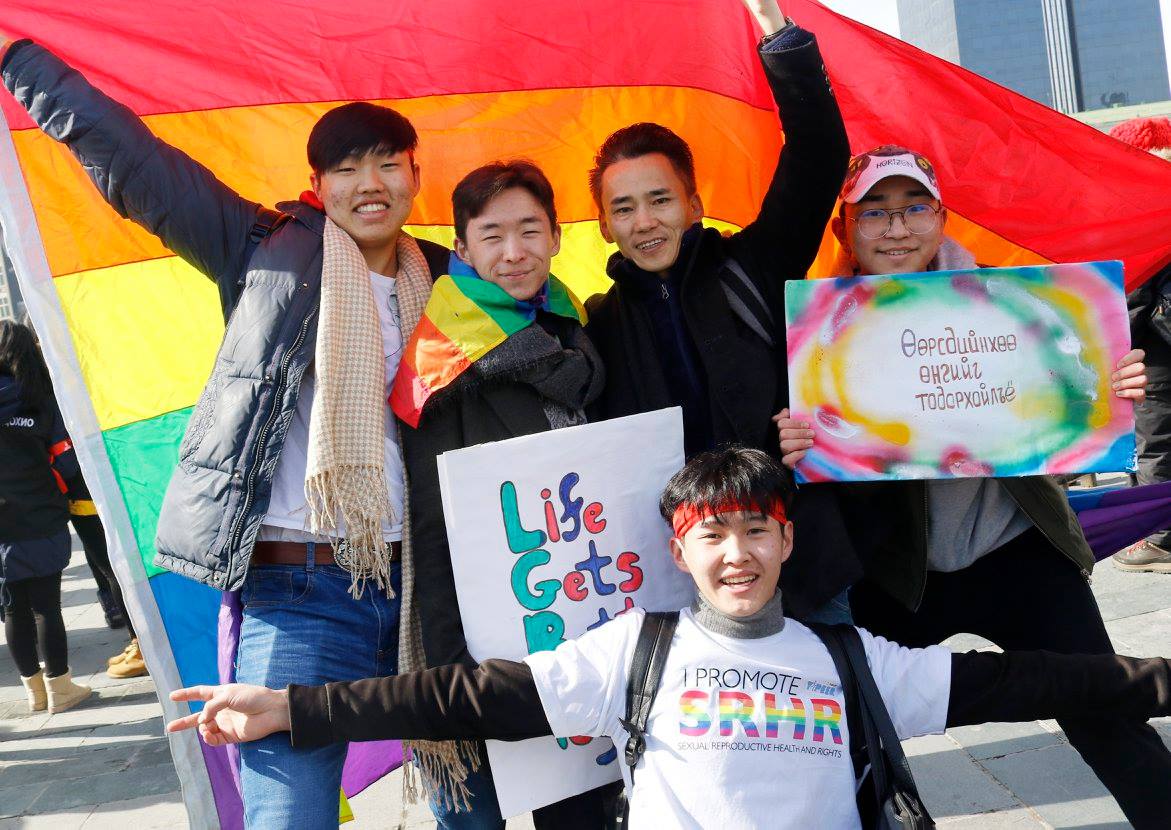
In Mongolia, LGBTQ activists are leveraging political transition to create progressive change.
Nyamdorj Anaraa has come out to his friends and family three times: first as a lesbian, second as a transgender man, and finally as a transgender man who is attracted to other men.
From a young age, Anaraa knew that he was different from his peers. For many years, he identified as a lesbian. He married a woman and the two became pillars of Mongolia’s burgeoning LGBTQ community. However, even within this community—which did not yet include people with alternative gender expression—Anaraa felt out of place.
Anaraa hated his female-assigned body. At first, in speaking to other women, he thought the body shame that he was experiencing was endemic to being a woman in a patriarchal society. When he tried to express his feelings to the group, he was met with sympathy and told that all women hate their bodies for falling short of established beauty standards. While he at first thought that his feelings stemmed from the same toxic source, he eventually realized that what he was feeling was instead gender dysphoria, the distress experienced from the misalignment of one’s gender identity and the sex one is assigned at birth.
In 2004, Anaraa embraced what he had not been able to express until then: he began telling people that he was trans. In 2011, he began his physical transition by pursuing surgery and hormone therapy. As Anaraa transitioned, he began to see the beauty in his body for the first time. “The more I became me, the more I came into my body,” he said in our April interview. “I began to see the beauty of myself and other men.” This profound psychological and physical change also precipitated his attraction to other men, and now he identifies as a queer trans man.

In the same way that Anaraa has undergone tremendous transition, so too has Mongolia. Only 28 years ago, the vast, yet sparsely-populated country became an unlikely democracy situated between two global superpowers. Mongolia has endured many economic and political trials, but because of its own commitment to democratic values and the urging of activists like Anaraa, it has become a leader in human rights protections for developing nations.
For Anaraa, the lack of resources available to him during his struggle for self-realization made his life more difficult. “Had I the language, had I the environment, had I even an inkling of [transgender] people […], had I been in a community where there was knowledge of other gender expressions, I wouldn’t have complicated my life so much by having to come out three times,” he laments. Indeed, Anaraa, now 41, came of age during a turbulent time for the country of Mongolia. During his childhood, Mongolia was a puppet regime of the Soviet empire. The country suffered under the poverty of late-stage communism and information did not easily find its way in or out of the country. In 1990, Mongolia’s youth staged a revolution, throwing off the Soviet yoke. As was true for many former socialist countries, the 1990s were a desperate time as the country struggled with its economic transition to democracy and capitalism. The Mongolia of Anaraa’s youth was not a place with access to resources for people struggling with queer identities.
Though not an ideal environment for navigating queer identities, Mongolia’s political transition provided Anaraa with the inspiration he later used to fight for LGBTQ rights in his country.
The Mongolia of Anaraa’s youth was not a place with access to resources for people struggling with queer identities. Click To TweetAnaraa’s was inspired by his mother’s activism. Tsendmaa Khorchinjav worked her whole life as an engineer in agrarian Mongolia’s iconic wool and cashmere industry. When Mongolia’s economic and political transition began, domestic manufacturers were unable to compete, and eager Chinese traders bought companies and raw agricultural materials wholesale. Tsendmaa’s colleagues chose her to lead the Federation of Wool and Cashmere Producers, an industry association, and she took to her charge of saving the quickly collapsing domestic industry. As Anaraa describes, his mother—who had lived her whole life under a communist system—threw herself into researching marketing, commodity pricing. She presented her findings to parliament and organized politically to pass a law that prohibited raw cashmere exports. This protectionist measure ensured that cashmere would be processed in Mongolia before being sold to other countries, protecting the industry and saving the jobs of countless Mongolian workers. Because of his mother’s work, Anaraa learned firsthand that change can be won by ordinary people organizing for legislative change.
Anaraa has dedicated his life to helping others find the self-knowledge and acceptance that was once elusive to him. In 2007, he and a group of passionate activists founded Mongolia’s LGBT Center, the first resource of its kind in the country. The group focuses on not only creating social awareness and acceptance of its community, but pursues an ambitious legislative agenda. While there is certainly discrimination against Mongolia’s queer community, the work of the LGBT Center has pushed the Mongolian government to adopt a legislative framework far more progressive than that of its neighbors. While other post-Soviet republics have seen an increase in intolerance towards queer communities, Mongolia has recently introduced new protections into law.

The LGBT Center’s political organization is savvy. In addition to finding allies in country, they have leveraged Mongolia’s international allies and the treaties that the country is party to in order to promote their legislative agenda. As a member of the United Nations (UN) and signatory to its treaties, Mongolia is periodically reviewed for its protection of universal human rights. In 2010, the freshly incorporated LGBT Center inserted itself as a civil society organization involved in evaluating Mongolia’s human rights progress and reporting back to the UN. This process yielded the recommendations that hate crimes should be outlawed, investigated, and that the perpetrators of such crimes should be punished; that the country should pass a comprehensive stand-alone law on discrimination that includes sexual orientation and gender identity; and that it improve public education on human rights and non-discrimination.
By going through the UN processes, the LGBT Center had established a mandate, which it could then use to hold the country of Mongolia accountable. The Center used this platform to maintain a dialogue with government and the National Human Rights Commission in order to push for reform.
Becoming Trans: Transgender Identity in the Middle Ages
theestablishment.co
Victory was not straightforward, however. When Mongolia overhauled its criminal code (which had been written in the communist era), the LGBT Center had hoped to include a classic anti-hate crime definition so as to expressly protect minorities. Instead, the new criminal code, passed in 2015 and in force since 2017, outlawed discrimination of any kind. While this was a victory, the broad wording of the new law does not explicitly protect the LGBTQ community in the way its members had hoped it would.
Anaraa and his colleagues realized that in order to receive this protection, they needed to make sure that hate crimes became recognized as discrimination. Mongolians needed to learn that engaging in hate speech or otherwise harming others because of their gender identity or sexual orientation did not constitute freedom of speech, but was now a form of discrimination under Mongolia’s new criminal code. They launched several initiatives to make sure that discrimination is widely recognized: they helped pass a law preventing medical discrimination against LGBTQ people and have provided education and treatment guidelines for medical professionals; they pushed for a ministerial resolution against police discrimination; and are currently fighting against employment discrimination and are actively engaged in debating a labor law in parliament.
In November 2017, a transgender woman was arrested for being drunk and disorderly. While in police custody, an officer pinned her to the floor and forcibly stripped her. The police division responsible did not find the officer guilty of any wrongdoing, and to date the LGBT Center is not aware if any disciplinary action that has been taken against this officer. The Center helped the victim file a complaint with the National Human Rights Commission. In helping bring her case to authorities for prosecution under the criminal code, the LGBT Center realized that beyond pursuing justice in her individual case, the police force as a whole would benefit from a better understanding of discrimination.

Aside from legal action, the Center focuses on education. As Anaraa explains, providing information and taking away fear of the unknown is crucial to changing people’s attitudes and gaining acceptance. “Once you’re able to claim your identity and fully live as yourself and be honest about your feelings […] people do accept you,” he said. “They might be shocked at first, but then you take the time to educate them and actually acceptance is very easy to come by.”
With support from the Asia Foundation and the U.S. and French embassies, the LGBT Center has developed a curriculum on discrimination and is training the Mongolian police force. The training—called “A Hate Free and Tolerant Mongolia”—uses lectures, case studies, and exercises to help police officers recognize discrimination and hate crimes. At the outset of training, some officers did not see the harm in discrimination and were inclined to express their personal opinions about minority groups in response to training prompts. Many officers expressed the belief that hate crimes do not exist in their country. Trainers described a divide between older and younger officers, gleaning optimism from the younger officers’ more tolerant attitudes and willingness to learn. Moreover, the training has been successful in that it has offered guidance to officers as to how to implement the new criminal code in their daily work.
As Anaraa explains, providing information and taking away fear of the unknown is crucial to changing people’s attitudes and gaining acceptance. Click To TweetBeyond creating a safer and more equitable country, training police officers in this way generates data to understand the depth of the problem and identify areas for improvement. Officers admitted that before the introduction of the new criminal code and training on its implications for their work, they were inclined to classify crimes that they could now identify as hate crimes as something else. For example, what they may have previously classified as a straightforward assault case, officers now know to classify as a hate crime if it was motivated by discrimination and bias towards a minority group.
The LGBT Center has now conducted six trainings of over 300 police officers, as well as some prosecutors and judges. They have been able to include officers from rural areas spanning Mongolia’s vast landscape and are currently completing training for all nine divisions of Ulaanbaatar’s police force. Anaraa believes that while this has been a strong start, for this training to truly have an impact over time it needs to be included in compulsory police academy curriculum to ensure that every officer understands what hate crimes are and their responsibility in preventing and prosecuting them.
Mongolia began its fight for LGBTQ equality by modeling the laws after other nations, but in doing so became a leader that other countries may now follow. Anaraa recently became the third transgender person in the country to legally change his gender marker on his government documentation, something that only one third of governments worldwide currently allow. He has spent the last eighteen years fighting tirelessly to improve the lives of LGBTQ people in Mongolia, and due in no small part to his effort, there is now a thriving community of leaders and activists.
After three years as the Executive Director, Anaraa recently resigned his leadership position. He will continue on in an advisory capacity while Munkhtuya Dashtsend, the Center’s former Legal Program Manager, leads the Center. He is content to live his life knowing that the group he helped found will continue to advocate for a more equal Mongolia. Looking ahead to the future, Anaraa believes the best times are yet to come. “Things will only get better […] the work of the LGBT Center will never be complete,” he said.“We have another fifty years of work ahead of us, but I do believe that in another ten years, we will have a very, very beautiful society.”

